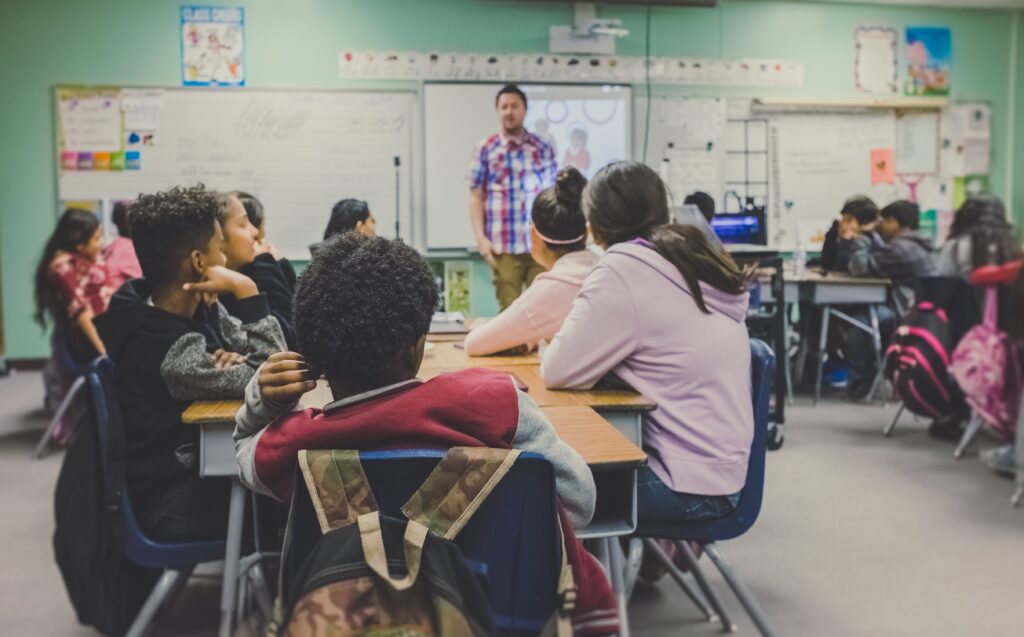ICOY supports the removal of police from schools
Publisher: ICOY Staff

Authors: Eilene Ladson (ICOY Program Director), Kathryn Culleeny (ICOY Juvenile Justice Manager), & Jocelyn Vega (ICOY Trauma Specialist)
As the nation continues to discuss the efficacy and impact of School Resource Officers (SROs), some universities and school districts have decided to cut ties entirely with police in their learning environments. In alignment with many educators, parents, students, and community members, Illinois Collaboration on Youth (ICOY) supports the removal of SROs from schools.
There is a common misconception that having police in schools creates a safer learning environment for students. However, ample research shows that instead of creating a nurturing environment resourced adequately with the social and mental health services needed to promote healing and prevent traumatic experiences, schools’ usage of SROs can create a punitive, fearful environment that distracts from learning1. Individual and systemic trauma impacts students, especially Black and Brown students, in their schools and communities as well as historically within the realities of over-policing, mass incarceration, and judicial disparities.
These same dynamics are replicated in schools, as many SROs are not equipped to provide trauma-informed or restorative services. Research shows that having SROs in schools increases the likelihood of Black and Brown youth being involved in the juvenile justice system and subsequently the school-to-prison pipeline due to the increased use of suspensions, expulsions, and arrests2 .
Research findings show police in schools cause more harm:
ICOY supports the long-term advocacy of community organizers fighting for the removal of SROs from schools and we stand by their efforts to demand school environments that best serve the needs of students in a trauma-informed way. ICOY grounds our decision in the wealth of research findings (see below) that underline the damaging impact of police in schools, including the traumatization of students (especially when abusive disciplinary practices are used) and the increased likelihood of entry to the school-prison pipeline . Overall, evidence shows that police in schools are more likely to harm students’ life development due to the adverse effects they have on students’ psychological, emotional, and mental wellbeing. See our key findings below:
- SROs in schools maintain the school-to-prison-pipeline. As found in an empirical review from the University of Florida College of Law, “regular contact with SROs is related to increased odds of referring students to law enforcement for lower-level offenses” that would otherwise be handled by school administrators.3
- SROs in schools disparately and negatively impact youth of color, especially Black youth. For example, “data from the 2015-2016 school year collected by the U.S. Department Office of Civil Rights showed that Black students represented 15 percent of the total student enrollment, and 31 percent of students who were referred to law enforcement or arrested” in school.4
- Youth with disabilities also experience disproportionate contact with school resource officers. In the 2015-2016 school year, data collected by the U.S. Department of Education Office for Civil Rights showed that “students with disabilities represented 12 percent of the overall student enrollment and 28 percent of students referred to law enforcement or who were arrested.”5
- An empirical review of current research found there is no conclusive evidence that the presence of school-based law enforcement has a positive effect on students’ perceptions of safety in schools.6
- In fact, police presence in schools can lead to decreases in school engagement, lower test scores, and can instead make students feel less safe and more stressed.7
- The “immediate presence of police may serve as a psychological trigger that over time has a compounding effect on the nervous and immune systems that may result in anxiety, restlessness, lack of motivation, inability to focus, social withdrawal, and aggressive behaviors.”8
- Constant, high levels of stress are known as toxic stress and severely disrupts brain development, learning, and emotional wellbeing. 9
- Strong mental health and social services in schools could help mitigate these high levels of stress and promote school safety.10
What methods CAN create safer learning environments for youth?
Whether you’re reading this as a parent, a community member, or a youth service professional, we urge you to rethink what safety looks like in your community and schools. Listed below are research-based guidelines and resources that support and offer alternatives to police in schools:
- Schools with inclusive social climates, those “where students feel valued, respected, listened to and are part of a community” report less behavioral misconduct. 11
- Researchers at Consortium on Chicago School Research at the University of Chicago found schools with a safe environment felt safe as a result of the school culture, specifically the quality of relationships between students, staff, and parents.12
- Mental health service providers improved both public safety in schools and outcomes for students.13
- The Dignity In Schools Coalition created a Model Code that schools and school districts can employ. Some relevant chapters are included here:
- Key Elements of School Climate and Positive Discipline
- Restorative Justice Practices
- Reduce Racial Disparities in Discipline
- Law Enforcement and Criminalization in School Environments
- Protect the Rights of Immigrant and Undocumented Students
- Support Youth with Disabilities
- Support LGBTQ+ and Gender Non-Conforming Students
As a collective voice for youth service providers across Illinois, we believe that all children deserve to have access to the resources and environment they need to reach their full potential. This includes schools that use alternatives to policing, are trauma-informed, equipped with adequate mental health services, and provide a safe environment for all students.
References
1 https://www.endzerotolerance.org/single-post/2019/03/11/Research-on-the-Impact-of-School-Policing
2 https://www.povertylaw.org/wp-content/uploads/2020/07/handcuffs-in-hallways-amended-rev1.pdf
3 (P. 976) https://scholarship.law.ufl.edu/cgi/viewcontent.cgi?article=1782&context=facultypub
4 (P. 3) https://www2.ed.gov/about/offices/list/ocr/docs/school-climate-and-safety.pdf
5 (P. 4) https://www2.ed.gov/about/offices/list/ocr/docs/school-climate-and-safety.pdf
6 (P. 2) https://www.wested.org/wp-content/uploads/2018/04/JPRC-Police-Schools-Brief.pdf
7 https://www.povertylaw.org/wp-content/uploads/2019/08/handcuffs-in-hallways-final.pdf
8 (P. 18) https://www.povertylaw.org/wp-content/uploads/2019/08/handcuffs-in-hallways-final.pdf
9 https://developingchild.harvard.edu/science/key-concepts/toxic-stress/
10 https://dignityinschools.org/wp-content/uploads/2018/10/WhyCounselorsNotCops.pdf
11 https://www.endzerotolerance.org/single-post/2019/03/11/Research-on-the-Impact-of-School-Policing
12 https://consortium.uchicago.edu/sites/default/files/2018-10/SAFETY%20IN%20CPS.pdf
13 https://www.wested.org/wp-content/uploads/2018/04/JPRC-Police-Schools-Brief.pdf.






